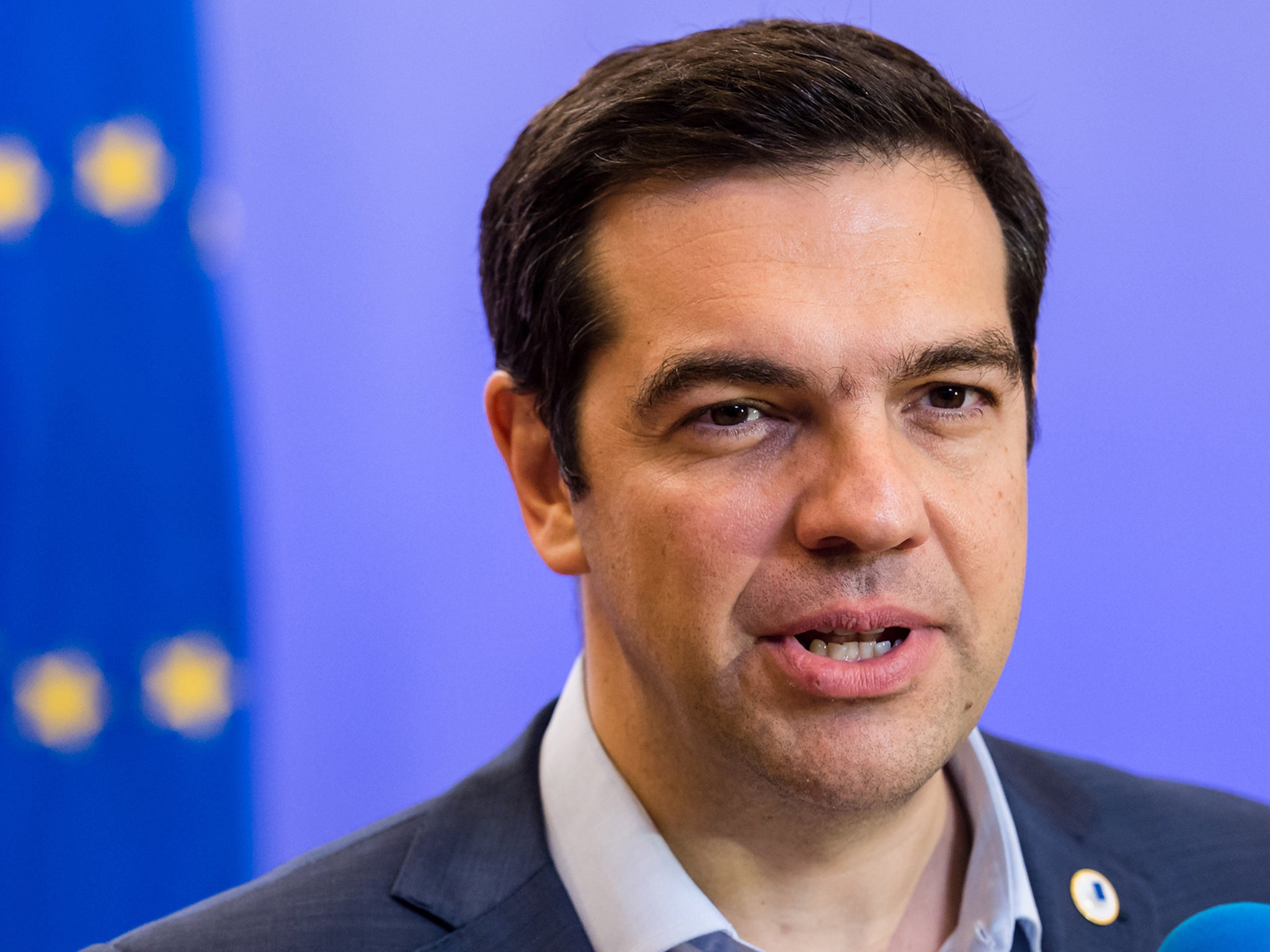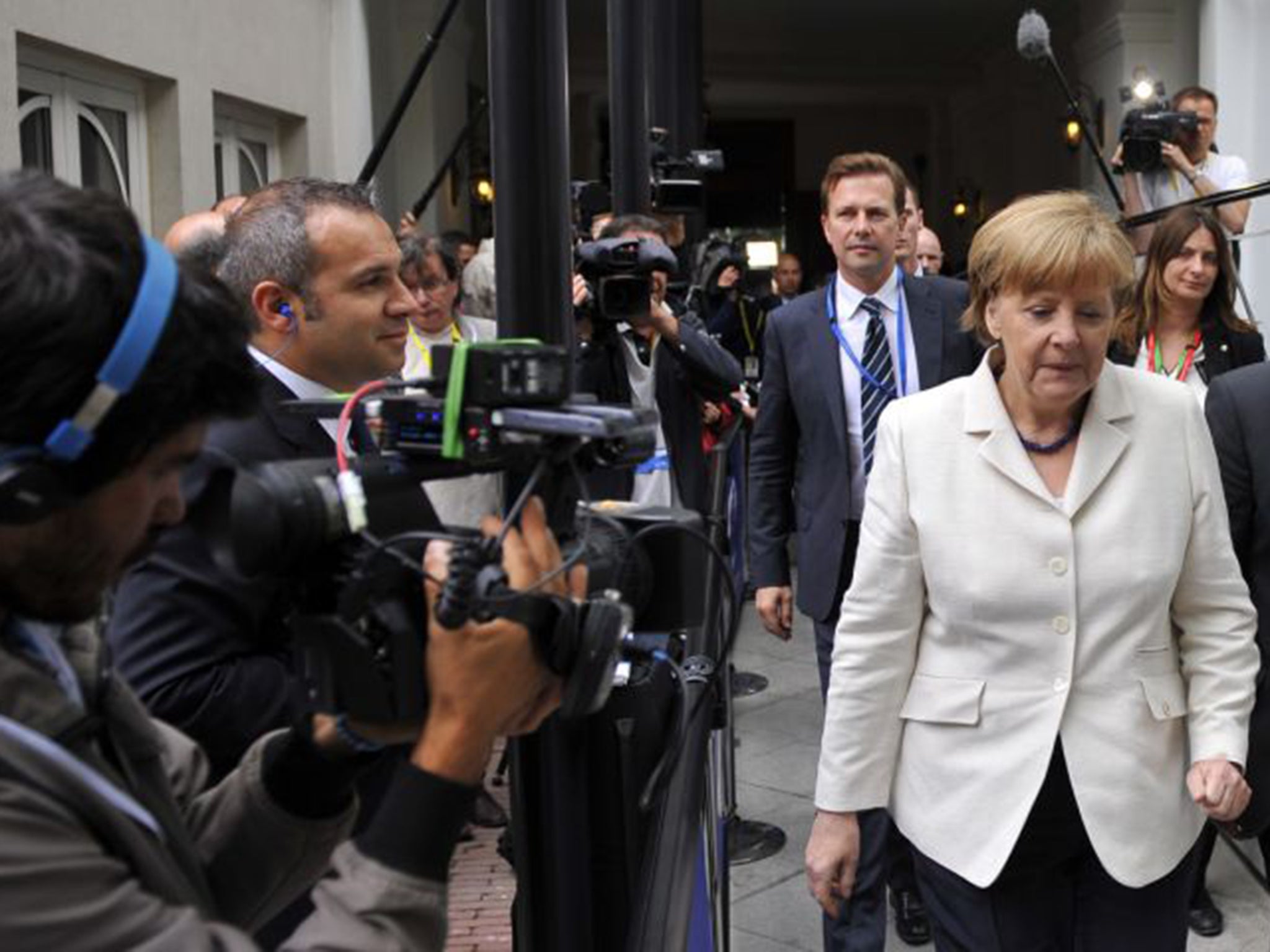Greek debt crisis: Alexis Tsipras given ultimatum – push through cuts this week or quit euro
Once-hawkish finance ministers are hopeful a deal can be done to keep Greece in eurozone

Your support helps us to tell the story
From reproductive rights to climate change to Big Tech, The Independent is on the ground when the story is developing. Whether it's investigating the financials of Elon Musk's pro-Trump PAC or producing our latest documentary, 'The A Word', which shines a light on the American women fighting for reproductive rights, we know how important it is to parse out the facts from the messaging.
At such a critical moment in US history, we need reporters on the ground. Your donation allows us to keep sending journalists to speak to both sides of the story.
The Independent is trusted by Americans across the entire political spectrum. And unlike many other quality news outlets, we choose not to lock Americans out of our reporting and analysis with paywalls. We believe quality journalism should be available to everyone, paid for by those who can afford it.
Your support makes all the difference.Greece is facing a fateful choice from its eurozone partners: either agree to drastic economic overhauls and budget cuts over the next few days or leave the single currency.
On Sunday night eurozone leaders meeting in Brussels for another extraordinary summit were finalising their last-chance offer to the Greek Prime Minister Alexis Tsipras as a condition for starting talks on a new rescue deal. A eurozone offer would insist that strict measures should be rushed through the Greek parliament by Wednesday.
The proposals on the table call for measures including new laws on the VAT and pension systems, the reform of bankruptcy rules, the privatisation of electricity transmission, and strengthening the independence of Greece’s statistics office before bailout talks can even begin. A particularly controversial suggestion is for €50bn in Greek assets to handed in escrow to eurozone authorities, and sold off if Athens fails to meet its reform promises.
Pushing the proposals through the Greek parliament would require Mr Tspiras to rely on opposition groups, as around 25 members from his own party are expected to vote against his perceived U-turn on austerity.

The leaders at the summit were still hammering out the details of a potential offer. The German Chancellor Angela Merkel seemed to speak for many countries when she warned that Mr Tsipras had squandered the goodwill of almost all his eurozone partners. “The most important currency has been lost and that is trust,” she said on the way into the summit. “There will be hard talks, and not unity at any price. We must be sure to weigh the pros and cons.”
While Mr Tsipras’s bailout request last week was almost identical to the one he campaigned against in last weekend’s referendum, the conclusion most leaders drew was not that the Prime Minister was coming round to their viewpoint, but rather that he could not be trusted.
Some countries rallied around a plan, tabled by German Finance Minister Wolfgang Schäuble, for a temporary Greek exit from the euro – which would allow Greece to restructure its debt without violating eurozone rules. The “time-out” of about five years was included in one draft version of the summit conclusions, although it was in brackets. It said: “In case no agreement could be reached, Greece should be offered swift negotiations on a time-out from the euro area, with possible debt restructuring.

The German plan offers another equally extreme option: transferring the legal ownership of state assets worth €50bn (£36bn) to a Luxembourg-based Institution for Growth in Greece, an effective escrow arrangement. Mr Tspiras is resisting this proposal, with officials describing it as an attempt to turn Greece into a eurozone vassal or protectorate.
Mr Tsipras sounded upbeat before the summit, telling reporters, “I am here, ready for an honest compromise.” He was buoyed by a softening of tone by some countries: the hawkish Finnish Finance Minister Alex Stubb, who was adamant on Saturday after the reportedly fractious eurozone ministers’ meeting that the only solution was a Greek exit from the euro, said: “I think there’s a very good proposal on the table.”
The Belgian Finance Minister Johan van Overtveldt said the ministers agreed on 90 per cent of a Greek solution. Another hawk, the Austrian Finance Minister Hans Jörg Schelling, admitted that Greek exit from the Eurozone “is off the table for now”.
The French President François Hollande was also hopeful. “France will do everything it can to ensure Greece can stay in,” he said. Mr Hollande dismissed the euro time-out. “There is no such thing as temporary Grexit.”
The leading historian Simon Schama said he believed that Germany’s demands on Greece were “the beginning of the end” for the European Union.
He said while the No vote in Greece’s referendum on austerity last week had been a Pyrrhic victory for the Syriza leader, his apparent capitulation to the demands of the Germany Chancellor amounted to the same thing for her.
“If Tsipras was wearing the crown of King Pyrrhus this time last week, Merkel is wearing it now. Her ultimatum beginning of end of EU,” he tweeted.
“Watch for profound psychological divisions to develop within EU: north-south; the surplus states and the beleaguered periphery.
“Punitive accounting will be felt, rightly or wrongly, as a kind of imperial occupation and no good for Europe will come of it.”
The hashtag, #ThisIsACoup, was trending on Twitter across Europe on Sunday night as people voiced their outrage at the terms offered to Greece. It was the top term in Greece and Germany, second worldwide and also featured in the top ten lists for the UK, France, Italy and Spain.
Martin Ellis-Hall tweeted: “How many British Pro Europeans are changing their minds about #Brexit ,I am for sure #ThisIsACoup.”
Mick Hannigan said: “Democracy, that's out! European unity, that's out! Economic management, that's out! #ThisIsACoup”
Anna Giouleka wrote: “Stop this madness before nationalists take 100% advantage of it and you have a new Ukraine #ThisIsACoup.”
Many people also urged the Greek Prime Minister to walk out with the hashtag, #TsiprasLeaveEUSummit.
Join our commenting forum
Join thought-provoking conversations, follow other Independent readers and see their replies
Comments